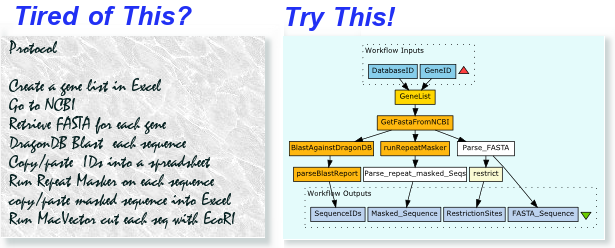Specification
- domain: #operation
- range : #unitTest
- domain: #unitTest
- range: xsd#string
- content: the full BioMOBY payload XML of an invocation message
- domain: #unitTest
- range: xsd#string
- content: the full BioMOBY payload of the associated output message
- domain: #unitTest
- range: xsd#string
- content: a regular expression that should match against the output BioMOBY Payload of this unitTest
- domain: #unitTest
- range: xsd#string
- content: an XPath expression that should match against the output BioMOBY Payload of this unitTest
Namespace:
Class:
-
#unitTest
usage:
-
can have one or more unitTests per service #operation
ObjectProperty:
-
#hasUnitTest
DatatypeProperty:
-
#exampleInput
DatatypeProperty:
-
#validOutputXML
DatatypeProperty:
-
#validREGEX
DatatypeProperty:
-
#validXPath
Example
Excerpt from an actual RDF document that describes a BioMOBY service:
...
<mygrid:operation>
<mygrid:hasUnitTest>
<mygrid:unitTest>
<!--
here is an example input to
invoke the service with
-->
<mygrid:exampleInput><![CDATA[
<moby:MOBY xmlns:moby='http://www.biomoby.org/moby'>
<moby:mobyContent>
<moby:mobyData queryID='1'>
<moby:Simple articleName='allele'>
<Object namespace="DragonDB_Allele" id="cho"/>
</moby:Simple>
</moby:mobyData>
</moby:mobyContent>
</moby:MOBY>
]]></mygrid:exampleInput>
<!-- this xpath statement returns
obtains hits when applied to
the service output given the
above service input
-->
<mygrid:validXPath>
<![CDATA[
/moby:MOBY/moby:mobyContent/moby:mobyData/moby:Simple/moby:Object
]]>
</mygrid:validXPath>
</mygrid:unitTest>
</mygrid:hasUnitTest>
...
Full RDF can be found here.

